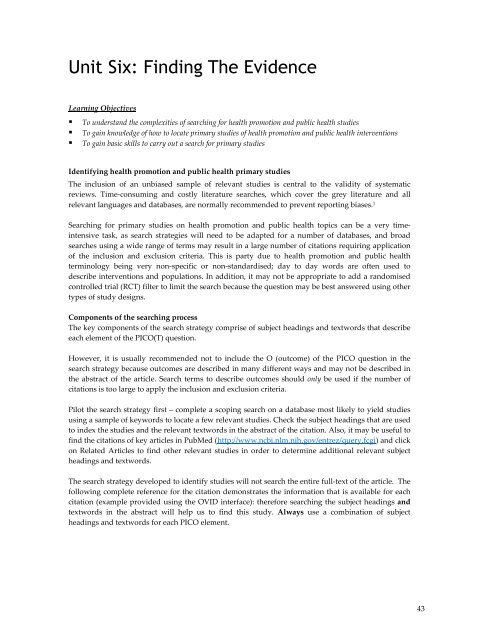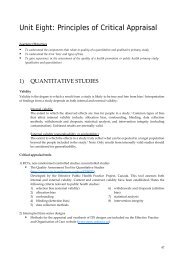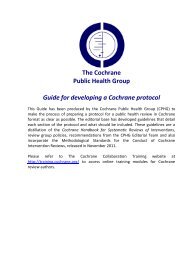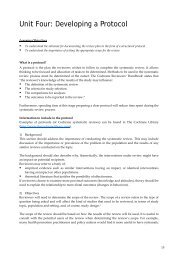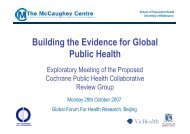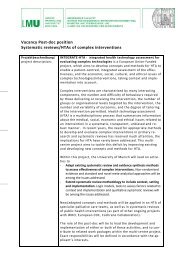Train the Trainer Course book - Cochrane Public Health Group
Train the Trainer Course book - Cochrane Public Health Group
Train the Trainer Course book - Cochrane Public Health Group
You also want an ePaper? Increase the reach of your titles
YUMPU automatically turns print PDFs into web optimized ePapers that Google loves.
Unit Six: Finding The Evidence<br />
Learning Objectives<br />
To understand <strong>the</strong> complexities of searching for health promotion and public health studies<br />
To gain knowledge of how to locate primary studies of health promotion and public health interventions<br />
To gain basic skills to carry out a search for primary studies<br />
Identifying health promotion and public health primary studies<br />
The inclusion of an unbiased sample of relevant studies is central to <strong>the</strong> validity of systematic<br />
reviews. Time-consuming and costly literature searches, which cover <strong>the</strong> grey literature and all<br />
relevant languages and databases, are normally recommended to prevent reporting biases. 1<br />
Searching for primary studies on health promotion and public health topics can be a very timeintensive<br />
task, as search strategies will need to be adapted for a number of databases, and broad<br />
searches using a wide range of terms may result in a large number of citations requiring application<br />
of <strong>the</strong> inclusion and exclusion criteria. This is party due to health promotion and public health<br />
terminology being very non-specific or non-standardised; day to day words are often used to<br />
describe interventions and populations. In addition, it may not be appropriate to add a randomised<br />
controlled trial (RCT) filter to limit <strong>the</strong> search because <strong>the</strong> question may be best answered using o<strong>the</strong>r<br />
types of study designs.<br />
Components of <strong>the</strong> searching process<br />
The key components of <strong>the</strong> search strategy comprise of subject headings and textwords that describe<br />
each element of <strong>the</strong> PICO(T) question.<br />
However, it is usually recommended not to include <strong>the</strong> O (outcome) of <strong>the</strong> PICO question in <strong>the</strong><br />
search strategy because outcomes are described in many different ways and may not be described in<br />
<strong>the</strong> abstract of <strong>the</strong> article. Search terms to describe outcomes should only be used if <strong>the</strong> number of<br />
citations is too large to apply <strong>the</strong> inclusion and exclusion criteria.<br />
Pilot <strong>the</strong> search strategy first – complete a scoping search on a database most likely to yield studies<br />
using a sample of keywords to locate a few relevant studies. Check <strong>the</strong> subject headings that are used<br />
to index <strong>the</strong> studies and <strong>the</strong> relevant textwords in <strong>the</strong> abstract of <strong>the</strong> citation. Also, it may be useful to<br />
find <strong>the</strong> citations of key articles in PubMed (http://www.ncbi.nlm.nih.gov/entrez/query.fcgi) and click<br />
on Related Articles to find o<strong>the</strong>r relevant studies in order to determine additional relevant subject<br />
headings and textwords.<br />
The search strategy developed to identify studies will not search <strong>the</strong> entire full-text of <strong>the</strong> article. The<br />
following complete reference for <strong>the</strong> citation demonstrates <strong>the</strong> information that is available for each<br />
citation (example provided using <strong>the</strong> OVID interface): <strong>the</strong>refore searching <strong>the</strong> subject headings and<br />
textwords in <strong>the</strong> abstract will help us to find this study. Always use a combination of subject<br />
headings and textwords for each PICO element.<br />
43


